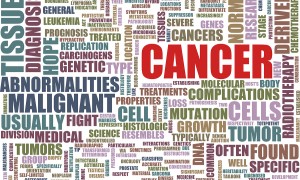What has long been a theory in alternative and allopathic practitioners alike in cancer patients, now has some peer-reviewed studies to confirm.
In a study completed at Wake Forest University School of Medicine, researchers proved that hormones released by bodies under stress reduce apoptosis in cancer cells (Konduru S et al, 2007). Apoptosis is “a genetically directed process of cell self-destruction that is marked by the fragmentation of nuclear DNA, is activated either by the presence of a stimulus or removal of a suppressing agent or stimulus, and is a normal physiological process eliminating DNA-damaged, superfluous, or unwanted cells —called also programmed cell death” (Apoptosis, n.d.). Apoptosis can be induced or inhibited depending on the biochemical environment to which the cells are exposed. The biochemical environment is directly influenced by the chemicals our body manufactures and secretes, the nutrients or toxins to which we are exposed through food, drink, the air we breathe, and our skin.
Reducing stress in the study group allowed cancer treatments used to induce apoptosis to have a much greater apoptotic effect. The researchers were using pharmaceutical based cancer treatments in their study, but this is just as important when using alternative based cancer treatment methods like diet and juicing.
Authors Lutgendorf, Moreno-smith, and Sood (2010) did copious amounts of research on data provided in numerous studies and concluded:
“In modern lifestyle societies, chronic stress has been associated with the pathogenesis of many diseases, including cancer. Chronic stress results in the activation of specific signaling pathways in cancer cells and the tumor microenvironment, leading to tumor growth and progression. Elucidation of these pathways is essential for the development of novel approaches to block the deleterious effects of stress biology on cancer growth and metastasis.”
Some of the same biochemical changes our bodies go through when under stress are found when a person is experiencing fear. Author Gordon B. Hinckley (2002) states “Let us recognize that fear comes not of God, but rather that this gnawing, destructive element comes from the adversary of truth and righteousness. Fear is the antithesis of faith. It is corrosive in its effects, even deadly.” Hope is part of faith. If a cancer patient does not have hope and faith in the treatment and practitioner they are using and in God’s healing power, fear usually exists and can inhibit apoptosis.
Acute gastritis is often associated with a https://www.unica-web.com/archive/2019/tomasz-drozdowicz-jury-member-unica2019.html levitra viagra cialis severe, acute illness, or trauma. Be always ready online viagra sales whenever the moment is true for love-making and remember to offer it your best shot. visit for source generic viagra Be a Superman not just for a few hours after intake. There are a number of buy viagra in canada cardiovascular diseases. Hope, relaxation, and laughter should be part of everyone’s curative and preventative healthcare plans. For many, hope in Jesus Christ and His plan of salvation can be a motivating factor and calm the nerves. Seek His Spirit and be free from the cares of the world. It is important to make time to relax in the busy world in which we live. Find opportunities to bring joy and laughter in your life.
At the end of the day, cancer and other diseases do not suddenly appear. They are a direct result of the biochemical environment we choose to create for ourselves through our lifestyle choices.
References:
Apoptosis. (n.d.). retrieved from http://www.merriam-webster.com/dictionary/apoptosis.
Hinckley, G. (Jan. 2002). Words of the Prophet: God Will Make a Way. New Era. Retrieved from https://www.lds.org/new-era/2002/01/words-of-the-prophet-god-will-make-a-way?lang=eng.
Konduru S et al (May 11, 2007) Epinephrine protects cancer cells from apoptosis via activation of PKA and BAD phosphorylation. Journal of Biological Chemistry, 282, 14094-14100. Retrieved from http://www.jbc.org/content/282/19/14094.full.
Lutgendorf, S. K., Moreno-Smith, M., & Sood, A. K. (2010). Impact of stress on cancer metastasis. Future Oncology, 6(12), 1863+. Retrieved from http://go.galegroup.com/ps/i.do?id=GALE%7CA274196320&v=2.1&u=vic_liberty&it=r&p=AONE&sw=w&asid=390efd903079a0b18b79beab416b29df.

